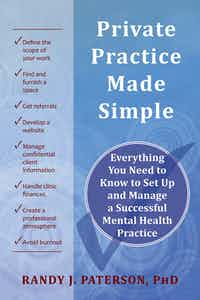By Randy J. Paterson, PhD
Clients who are depressed, on disability, or unemployed often find themselves lapsing into an amorphous life. They can’t find reasons to get out of bed, clean themselves up, or accomplish things, and doing so depends entirely on their impaired willpower.
Therapists often advocate an increase in structure—adopting a stable sleep-wake schedule, getting out of the house every day, exercising, and so on. To the unmotivated client, this can seem overwhelming. Some imagine that they need to have every minute scheduled, which feels impossible, and so it does not happen.
To get the process started, point out that each day is composed not of 24 hours, but of three periods: morning, afternoon, and evening. We don’t want every minute of the day booked up. That isn’t a healthy way of living either. But it helps to have at least one thing to do in each period.
How about a walk with a friend? That’s Tuesday morning taken care of. Your favorite TV show? Good enough for Thursday evening. Your therapy appointment? There’s Friday afternoon.
The single item in each period provides the bones onto which the client can build the flesh of a full life. More tasks can be added to each box as time goes on. On the way home from therapy, perhaps she will stop in to the grocery store. After walking with her friend, maybe she could read a novel in the park.
It helps to have a simple seven-column (the days of the week), three-row (periods of each day) table you can hand a client when discussing this idea. Its simplicity can help clients relax and feel less overwhelmed by the prospect of taking control of their lives. They don’t have to be busy every minute. They just need one thing for each box. If they’ve left some periods blank, you can ask them later to compare how they felt in empty versus busier periods.
 Randy J. Paterson, PhD owns and operates Changeways Clinic, a private multiple-provider outpatient practice in Vancouver, British Columbia. He is author of The Assertiveness Workbook and Private Practice Made Simple. Through Changeways Clinic, he presents lectures and workshops internationally on topics including mental health policy, cognitive behavioral therapy, the nature and treatment of depression and anxiety disorders, and strategies for private practice management. He was the 2008 recipient of the Canadian Psychological Association's Distinguished Practitioner Award. To view Randy Paterson's blog on psychological and practice issues, please visit www.psychologysalon.com.
Randy J. Paterson, PhD owns and operates Changeways Clinic, a private multiple-provider outpatient practice in Vancouver, British Columbia. He is author of The Assertiveness Workbook and Private Practice Made Simple. Through Changeways Clinic, he presents lectures and workshops internationally on topics including mental health policy, cognitive behavioral therapy, the nature and treatment of depression and anxiety disorders, and strategies for private practice management. He was the 2008 recipient of the Canadian Psychological Association's Distinguished Practitioner Award. To view Randy Paterson's blog on psychological and practice issues, please visit www.psychologysalon.com.
Want the newest Quick Tips for Therapists delivered directly to your email inbox? Sign up today!

 Part 2: What to Do When a Client Is Participating in Self-Judgment?
Part 2: What to Do When a Client Is Participating in Self-Judgment?